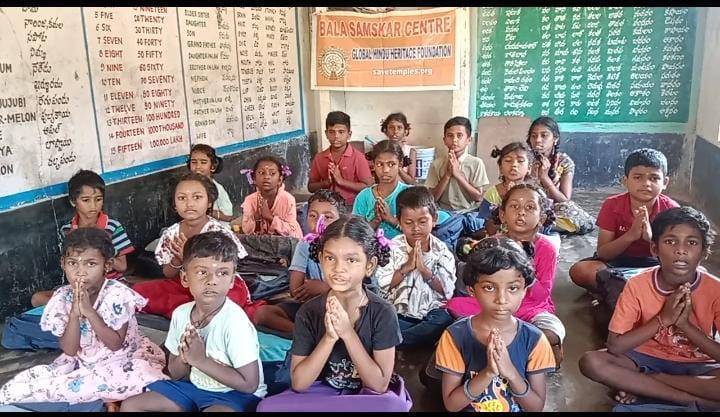[GHHF] Bala Samskar Kendra students laerned about Pandit Deendayal Upadhyaya and his in strengthening BJP.
 “Some live till death; some live after death. Pandita Deendayal Upadhyaya belongs to the second category.”
“Some live till death; some live after death. Pandita Deendayal Upadhyaya belongs to the second category.”
Global Hindu Heritage Foundation is committed to talk about the great souls who shaped Bharat with their selfless service to ensue the present generation will enjoy the freedom. This week we talked about Deendayal Upadhyaya. Born on September 25, 1916, in a very ordinary family, Deenadayalji grew up to be an extraordinary person. His mother and father died in his childhood, so he grew up in his uncle's house. Dayal, who started primary education in 1925, came into contact with the RSS while doing his BA in Kanpur. Since then, his lifestyle and destiny have changed. While working in Sangh, he completed his BA, degree, and MA in teacher training in the first year.
He gave up his studies to devote his full time to the expansion of Sangh. Within a few years of his appointment as a campaigner for the Labhampur region in Uttar Pradesh, Sangh's activities flourished there. Noticing that, Sangh elders appointed them co-propagandists of the Uttar Pradesh region. His unique talent impressed everyone.
While watching the Sangh's activities, he formed an organization called Rashtra Dharma Prakashan, which focused on the press sector. Through Prakashan, a monthly magazine called Rashtra Dharma, a weekly magazine called Panchajanya, and a daily magazine called Swadesh were started. Those magazines became symbols of Deenadayalji's work!
The Prime Minister of the day, Nehru, banned the Sangh, blaming the crime of shooting Gandhiji on the Hindu Mahasabha as well as the RSS. The role played by Deena Dayalji in Uttar Pradesh was significant for the movement to remove the ban. The government of that day banned Panchajanya for its writings against the oppressive policies of the government, clarifying in Deendayal ji Panchajanya that the Sangh had no role in this murder. Instead, he started another weekly magazine called Himalaya, creating a disturbance in the government of the day with his pen. In the meantime, the Supreme Court of India ruled that the RSS had no role in the assassination of Gandhiji.
His writings continued his views and basic theories on race, nationality, Indian culture, dharma, etc. Dayalji also wrote historical novels Samrat, Chandragupta, and Jagadguru Shankaracharya, applying the social, economic, and political policies of the time and the essence of Indian philosophy to the contemporary conditions of the country.
In 1951, Dr. Shyam Prasad Mukherjee resigned as Union Minister in protest of Prime Minister Nehruji's policies. To face the policies of Muslim appeasement and anti-Hindu dharma followed by the then-ruling Congress Party Prime Minister Nehru, to establish a political party with members of Indian culture and national sentiments, then RSS Sir Sangh Chalak sought the help of Parama Pujya Guruji. Pandit Deen Dayal Upadhyay, Atal Ji, Jagannath Raoji, Sundar Singh Bhandari, and some other youths were handed over according to his wish.
Dr. Shyam Prasad Mukherjee was elected General Secretary of the Jana Sangh Party on 21 October 1951. The Election Commission recognized Jana Sangh as one of the four national political parties that contested the general elections held in 1952, three months after the party was founded. The Jana Sangh could prove its presence in general elections. This was supported by the leadership of Dr. Shyam Prasad Mukherjee and the coordination skills of Deen Dayal ji.
After that, Dr. Mukherjee, who conducted satyagraha in Kashmir, died suspiciously. After the death of Dr. Shyam Prasad Mukherjee, Deena Dayalji and his colleagues are credited with strengthening the party across the country, turning upside down the thoughts of those who hoped that the Jana Sangh would become nameless. Bharatiya Jan Sangh proposed the doctrine of Ekta Mata Humanism to silence those who had no doctrines.
It argues that the right way of life is for the downtrodden human being to flourish with worldly comfort and to serve humanity with a spiritual vision. For a long time, Deen Dayalji, who served as the All-India Secretary of the Bharatiya Jan Sangh, won the workers' hearts and occupied a prominent place in their minds.
Not knowing what happiness is and experiencing hardships, he engaged in national service and accepted it as his life's work. Since joining the Jana Sangh, he became the party's All India President in 1967 and was instrumental in giving the Jana Sangh a special place in the country's politics. At the All-India Jana Sangh Mahasabha held in Calicut, he presented the Darshan of India and gained great fame. That fame caused the displeasure of the opponents of the Jana Sangh ideology. Mahatapasvi became a victim of their evil politics. He was found dead on 11 February 1968 near the railway tracks at Mughal Sarai railway station in Uttar Pradesh. Like the death of Dr. Shyam Prasad Mukherjee, Deenadayalji's death also led to many suspicions. The death of a great man like Deenadayalji deeply saddens the hearts of activists.
Your donations are appreciated;
By Zelle: ghhfusaorg@gmail.com
PayPal: savetemples.org
By Check: Or you can send a check payable to GHHF, 14726 Harmony Lane, Frisco, TX 75035.
It is tax-deductible.
By Rupees: call 601-918-7111; +91 83096 43979





















 Urgent support needed for Bangladesh Hindus
Urgent support needed for Bangladesh Hindus 







